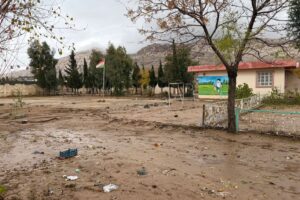
Shafaq News
N.S. (pseudonym) was still a teenager when sectarian
violence tore through Iraq in the mid-2000s. She stood frozen as her father was
shot dead, the sound of her mother and sisters crying etched into her memory.
Nearly three decades later, the fear born that day continues to shape her life.
At 45, she refuses to marry, convinced that anyone she loves will also be taken
away from her.
Three years after her father’s death, N.S. lost the ability
to speak. Her mother, concerned about social stigma, rejected psychiatric
treatment and confined her daughter to a separate room, believing that seeking
medical help would bring shame. Her story reflects a wider, silent epidemic of
untreated trauma affecting millions across Iraq.
Scars Run Deep
Years of conflict, unrest, and political instability have
left Iraqis facing deep psychological scars. Depression, schizophrenia, and
other mental health disorders are increasingly common. Studies estimate that
more than one in five Iraqis suffer from mental illness, while government data
released in 2024 shows suicide cases have surged 40% over the past decade,
reaching 772 incidents.
Many young Iraqis carry personal burdens similar to N.S.’s.
Nineteen-year-old protester Seif Ramzi lost friends during the October 2019
demonstrations, withdrawing from daily life and developing severe depression.
His father avoided psychiatric care, fearing social stigma.
Ramzi recounted to Shafaq News, “My father kept taking me
from one sorcerer to another. Some prescribed bizarre remedies — mouse ears, a
cat’s tail, boiled and inhaled at sunset. These rituals only intensified my
misery.”
The stress of daily life in Iraq — including political
instability, economic hardship, power cuts, traffic congestion, and extreme
heat — compounds mental strain. The COVID-19 pandemic in 2020 further affected
mental health, with national surveys indicating that 68% of Iraqis believe
these challenges have strained their relationships, often leading to isolation
and family conflict.
Children are particularly vulnerable, and research showed
that 22% of Iraqi children experience depression, while 38% live with anxiety,
reflecting the broad reach of trauma across age groups.
Barriers To Care
Even for those willing to seek help, private care is often
unaffordable. “Doctors charge 100,000 dinars ($77) for a single visit,”
remarked Abdullah al-Qaisi. “How can Iraqis pay that several times a week?”
Psychology student Hossam al-Rawi highlighted the social
stigma surrounding mental health, noting that many people fear visiting a
psychiatrist could expose their secrets or lead to blackmail. Others believe
doctors only prescribe sedatives that induce sleep and cause addiction.
“That’s not the case — treatments vary, often for limited
periods, and sometimes involve only recommendations or medication taken as
needed,” he clarified.
However, Iraq faces a severe shortage of mental health
resources, with only six psychiatric hospitals and roughly 0.57 psychiatrists
per 100,000 people, far below the global average of around nine.
By comparison, Lebanon has more than one psychiatrist per
100,000 people, and Jordan approaches 1.5. This scarcity leaves millions of
Iraqis without adequate support, profoundly affecting their family life and
social well-being.
Change on Horizon
Despite these barriers, demand for psychiatric care is
increasing. Psychiatrist Adnan al-Qarah Ghouli shared with our agency that he
has treated more than 18,000 patients since 2019, with numbers surging during
the COVID pandemic. Many are youth and children struggling with insomnia and
hyperactivity linked to excessive phone use.
“Female patients outnumber men significantly,” he noted,
citing that cultural attitudes discourage men from seeking psychiatric or
sexual health care.
In turn, consultant psychiatrist Ali al-Fatlawi observed a
broader shift. “Compared to the past, more Iraqis are seeking psychiatric care,
but the numbers remain below actual needs,” he explained, emphasizing that
“People usually come only after their condition worsens or after trying non-medical
solutions.”
He also highlighted sharp rises in anxiety, depression, and
post-traumatic stress, particularly among survivors of domestic violence,
substance abuse, and behavioral addictions such as online gaming. “What stands
out is that young people, particularly in Baghdad and Erbil, are more open to
mental health care.”
“They understand that treatment is not madness, but a way to
improve quality of life and manage stress,” he added, stressing that “The real
challenge is not just treatment, but overcoming social barriers and promoting
awareness that mental health is part of overall health.”
Clicks to Heal
Some Iraqis are also turning to online counselling, with
patient Tayba Mahmoud explaining how remote sessions helped her recover.
“Online sessions save time, protect privacy and ease anxiety. I benefited from
them and my condition improved.”
Yet, Psychiatrist Moammal Khaled pointed out several
limitations, noting that “Poor internet connections and the lack of quiet
spaces in most Iraqi homes make online therapy difficult.”
Doctors need to observe body language and interact directly
to provide effective care, he concluded.
Written and edited by Shafaq News staff.





